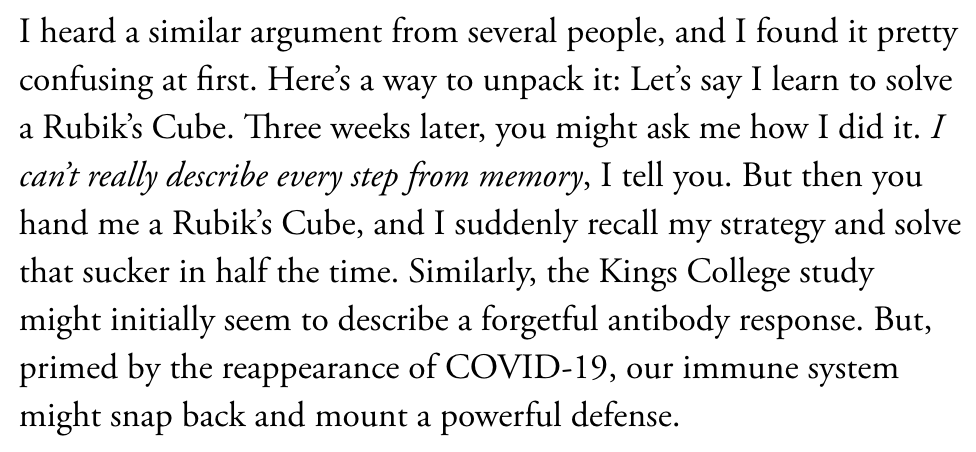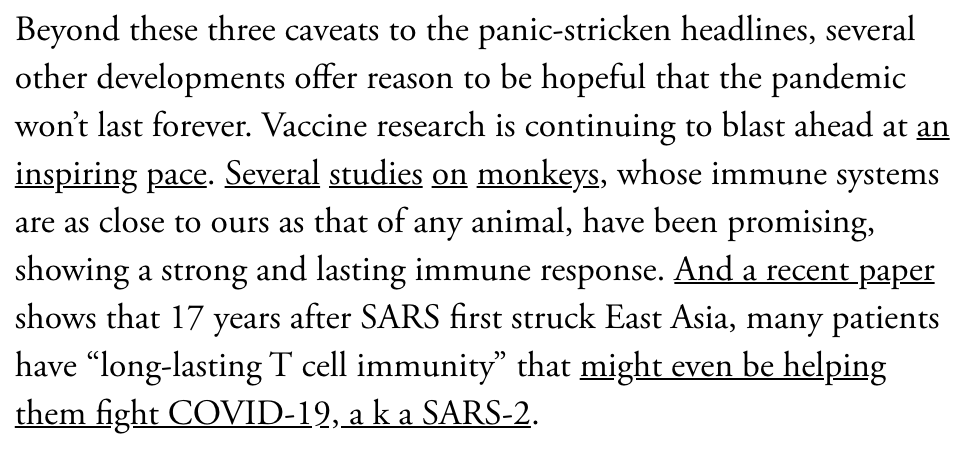I wrote about that UK study that launched a thousand headlines screaming about how our COVID-19 immunity goes away after a few weeks and a vaccine is doomed.
https://www.theatlantic.com/ideas/archive/2020/07/could-covid-19-immunity-really-disappear-months/614377/
TLDR:">https://www.theatlantic.com/ideas/arc... Those headlines were garbage, but immunity is complicated.
https://www.theatlantic.com/ideas/archive/2020/07/could-covid-19-immunity-really-disappear-months/614377/
TLDR:">https://www.theatlantic.com/ideas/arc... Those headlines were garbage, but immunity is complicated.
What the Kings College study found:
They tested more than 90 ppl with COVID-19 from March to June. Several weeks after infection, their blood was swimming with antibodies. Two months later, many of these antibodies had disappeared, esp for patients with milder symptoms.
They tested more than 90 ppl with COVID-19 from March to June. Several weeks after infection, their blood was swimming with antibodies. Two months later, many of these antibodies had disappeared, esp for patients with milder symptoms.
Why that freaked out a lot of ppl:
Acquired immunity is a kind of cellular memory. If our immune systems truly can& #39;t be taught how to fight COVID for more than a few weeks at a time, vaccines could require constant boosters (and herd immunity is a total pipe dream) .
Acquired immunity is a kind of cellular memory. If our immune systems truly can& #39;t be taught how to fight COVID for more than a few weeks at a time, vaccines could require constant boosters (and herd immunity is a total pipe dream) .
Three reasons to be less scared:
1. The immune system is a big place, and this study only looked at one part of it. It didn& #39;t look at T cells, which some scientists are starting to think is the most important part of our immune response to COVID.
1. The immune system is a big place, and this study only looked at one part of it. It didn& #39;t look at T cells, which some scientists are starting to think is the most important part of our immune response to COVID.
Killer T cells are kinda like stealth bombers: You can& #39;t understand the air force w/o accounting for them, but they& #39;re harder to detect.
Still, this study found ppl recovering from COVID showed strong T-cell responses without detectable antibodies. Huge.
https://www.medrxiv.org/content/10.1101/2020.06.21.20132449v1">https://www.medrxiv.org/content/1...
Still, this study found ppl recovering from COVID showed strong T-cell responses without detectable antibodies. Huge.
https://www.medrxiv.org/content/10.1101/2020.06.21.20132449v1">https://www.medrxiv.org/content/1...
2. As @profshanecrotty told me: “It’s not unusual to have fading antibody response after several months." With smallpox vaccine, antibodies plummet after six months, but the vaccine works for decades.
A lean, mean, virus-fighting machine can still help us!
A lean, mean, virus-fighting machine can still help us!
3. Related to (2), diminished antibody levels can still prime a BIG immune response when the virus shows up again—even though the levels had looked puny beforehand.
I liken it to the muscle memory that returns to us when we see a problem we& #39;ve already solved.
I liken it to the muscle memory that returns to us when we see a problem we& #39;ve already solved.
Declining neutralizing antibody levels isn& #39;t good. Nobody is rooting for it.
But one study should be placed in a broader context: There is is mounting evidence from vaccine and monkey trials and SARS-1 that this disease isn& #39;t a total weirdo when it comes to immune memory.
But one study should be placed in a broader context: There is is mounting evidence from vaccine and monkey trials and SARS-1 that this disease isn& #39;t a total weirdo when it comes to immune memory.
Big picture: This is a new disease. The immune system is a vast, mysterious place.
Don& #39;t draw over-pessimistic conclusions from 1 study looking at 1 piece of that vast place. Bring on the T cell data! Onward with the vaccine trials! @EricTopol https://www.theatlantic.com/ideas/archive/2020/07/could-covid-19-immunity-really-disappear-months/614377/">https://www.theatlantic.com/ideas/arc...
Don& #39;t draw over-pessimistic conclusions from 1 study looking at 1 piece of that vast place. Bring on the T cell data! Onward with the vaccine trials! @EricTopol https://www.theatlantic.com/ideas/archive/2020/07/could-covid-19-immunity-really-disappear-months/614377/">https://www.theatlantic.com/ideas/arc...

 Read on Twitter
Read on Twitter





